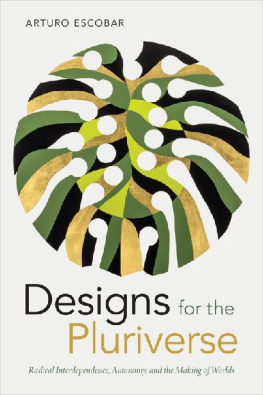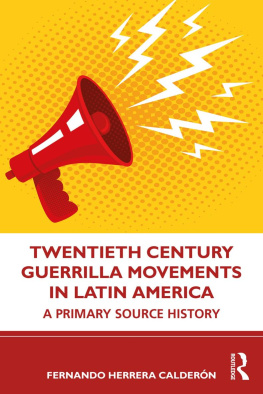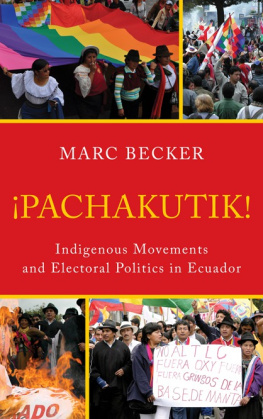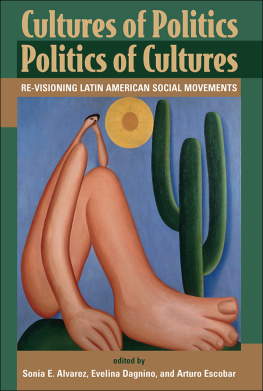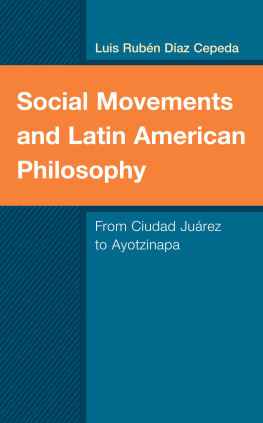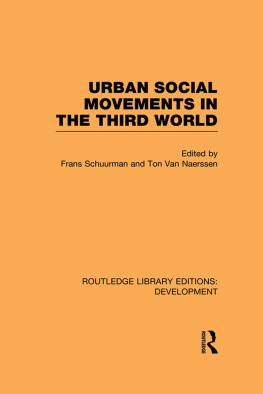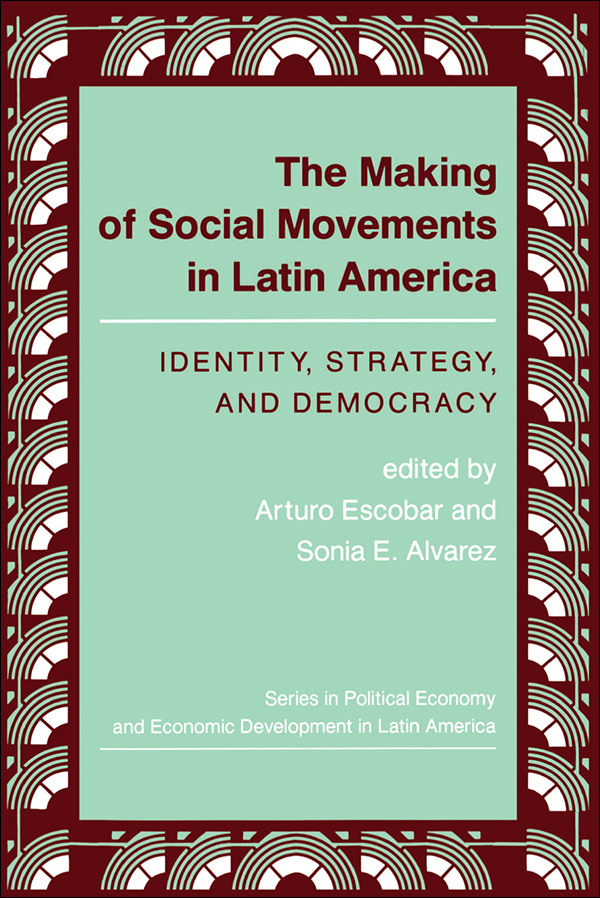Available in hardcover and paperback.
The Making of Social Movements in Latin America
Identity, Strategy, and Democracy
edited by
Arturo Escobar
Smith College
Sonia E. Alvarez
University of CaliforniaSanta Cruz

Series in Political Economy and Economic Development in Latin America
First published 1992 by Westview Press
Published 2018 by Routledge
711 Third Avenue, New York, NY 10017, USA
2 Park Square, Milton Park, Abingdon, Oxon OX14 4RN
Routledge is an imprint of the Taylor & Francis Group, an informa business
Copyright 1992 Taylor & Francis
All rights reserved. No part of this book may be reprinted or reproduced or utilised in any form or by any electronic, mechanical, or other means, now known or hereafter invented, including photocopying and recording, or in any information storage or retrieval system, without permission in writing from the publishers.
Notice:
Product or corporate names may be trademarks or registered trademarks, and are used only for identification and explanation without intent to infringe.
Library of Congress Cataloging-in-Publication Data
The making of social movements in Latin America : identity, strategy,
and democracy / edited by Arturo Escobar, Sonia E. Alvarez,
p. cm. (Series in political economy and economic
development in Latin America)
Includes bibliographical references and index.
ISBN 0-8133-1206-X. ISBN 0-8133-1207-8 (pbk.)
1. Social movementsLatin America. I. Escobar, Arturo.
II. Alvarez, Sonia E., 1956- III. Series.
HN110.5.A8M325 1992
303.484098dc20
92-9068
CIP
ISBN 13: 978-0-8133-1207-1 (pbk)
Contents
, Arturo Escobar and Sonia E. Alvarez
PART 1
CONCEPTUALIZING SOCIAL MOVEMENTS IN CONTEMPORARY LATIN AMERICA
, Fernando Calderon, Alejandro Piscitelli, and Jose Luis Reyna
, Norma Stoltz Chinchilla
, Judith Adler Hellman
, Arturo Escobar
PART 2
THE MAKING OF COLLECTIVE IDENTITIES
, Orin Starn
, Mara Teresa Findji
, Amy Conger hind
, Mara Pilar Garca
, John Burdick
, Edward MacRae
PART 3
ARTICULATING STRATEGIES AND DEMOCRATIZING DEMOCRACY
, Nancy Saporta Sternbach, Marysa Navarro-Aranguren, Patricia Chuchryk, and Sonia E. Alvarez
, Vivienne Bennett
, Cathy Schneider
, Eduardo Canel
, Ruth Corra Leite Cardoso
, Orlando Fals Borda
, Sonia E. Alvarez and Arturo Escobar
This book grew out of our shared and growing interest in contemporary social movements and the vast theoretical literature on these movements produced during the 1980s, particularly in Latin America and Western Europe. The fact that this literature was very little known in the United States was one of the motivating forces behind our effort. This anthology, however, was also a logical extension of our respective previous projects. Sonia Alvarezs study of the rise and development of the Brazilian womens movement pointed toward the broader problem of understanding the nature and impact of social movements under conditions of transition to democracy. Arturo Escobars dissertation on the invention of development and the crucial role played by this discourse in the production of post-World War II Latin America equally called for an investigation of the actual and potential role of collective action in transforming entrenched notions and strategies of local, regional, and national development.
We first conceived this project in 1988, when we both were teaching at the University of California at Santa Cruz. We wanted to convey to our students the excitement that we sensed in the writings of our Latin American colleagues about the forms of protest observed in the region during the 1980s, perhaps as an antidote to the otherwise gloomy picture offered by what has been called Latin Americas lost decade. Although the Nicaraguan revolution and the struggle in El Salvador had fueled the hopes of manyand rightly sowe nevertheless wished to provide a view of the multiple forms of organized resistance that many people had been able to maintain during the 1980s, though perhaps less glamor-ously and against all odds. We both had the opportunity to teach undergraduate courses on social movements, with partially different but complementary orientations. We also started to meet regularly with a small group of Bay Area people interested in social movements issues, which included Vivienne Bennett, Cathy Schneider, and Teresa Carrillo. The momentum provided by these activities crystallized in the organization of panels on the topic for both the 1989 and 1991 Latin American Studies Association (LASA) congresses, to which we were able to invite some of the authors represented in this anthologyOrlando Fals Borda, Maria Pilar Garcia, Vivienne Bennett, Judith Hellman, Amy Lind, and Cathy Schneider.
The LASA panels were but one of the strategies we used in working closely with our contributors to develop a coherent framework for this anthology and encourage fruitful debates and collaboration among contributing authors. What we have assembled is an interdisciplinary collection that examines comparatively the three dimensions of change most commonly attributed to social movements in contemporary Latin America: their role in forming or reconstituting collective identities; their innovative social practices and political strategies in pursuit of socioeconomic, cultural, and political change; and their actual or potential contributions to alternative visions of development and to the democratization of political institutions and social relations. In this way, the anthology represents a collective theoretical reflection on the nature and present status of the study of social movements in the regiona subject in which all of our contributors, who include some of the foremost scholars in the field, have been significantly engaged.


